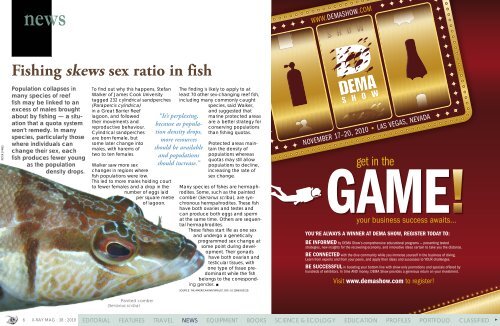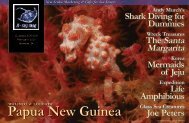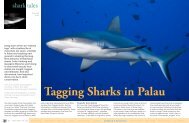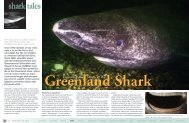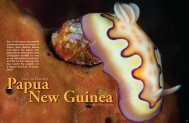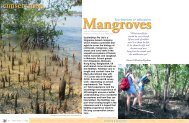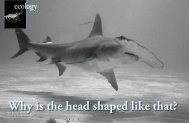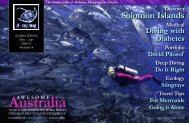Medium resolution version of X-Ray Magazine (96 dpi)
Medium resolution version of X-Ray Magazine (96 dpi)
Medium resolution version of X-Ray Magazine (96 dpi)
Create successful ePaper yourself
Turn your PDF publications into a flip-book with our unique Google optimized e-Paper software.
news<br />
www.demashow.com<br />
Fishing skews sex ratio in fish<br />
Peter Symes<br />
Population collapses in<br />
many species <strong>of</strong> reef<br />
fish may be linked to an<br />
excess <strong>of</strong> males brought<br />
about by fishing — a situation<br />
that a quota system<br />
won’t remedy. In many<br />
species, particularly those<br />
where individuals can<br />
change their sex, each<br />
fish produces fewer young<br />
as the population<br />
density drops.<br />
To find out why this happens, Stefan<br />
Walker <strong>of</strong> James Cook University<br />
tagged 232 cylindrical sandperches<br />
(Parapercis cylindrica)<br />
in a Great Barrier Reef<br />
lagoon, and followed<br />
their movements and<br />
reproductive behaviour.<br />
Cylindrical sandperches<br />
are born female, but<br />
some later change into<br />
males, with harems <strong>of</strong><br />
two to ten females.<br />
Walker saw more sex<br />
changes in regions where<br />
fish populations were low.<br />
This led to more males holding court<br />
to fewer females and a drop in the<br />
number <strong>of</strong> eggs laid<br />
per square metre<br />
<strong>of</strong> lagoon.<br />
The finding is likely to apply to at<br />
least 70 other sex-changing reef fish,<br />
including many commonly caught<br />
species, said Walker,<br />
“It’s perplexing,<br />
because as population<br />
density drops,<br />
more resources<br />
should be available<br />
and populations<br />
should increase.”<br />
and suggested that<br />
marine protected areas<br />
are a better strategy for<br />
conserving populations<br />
than fishing quotas.<br />
Protected areas maintain<br />
the density <strong>of</strong><br />
populations whereas<br />
quotas may still allow<br />
populations to decline,<br />
increasing the rate <strong>of</strong><br />
sex change.<br />
Many species <strong>of</strong> fishes are hermaphrodites.<br />
Some, such as the painted<br />
comber (Serranus scriba), are synchronous<br />
hermpahrodites. These fish<br />
have both ovaries and testes and<br />
can produce both eggs and sperm<br />
at the same time. Others are sequential<br />
hermaphrodites.<br />
These fishes start life as one sex<br />
and undergo a genetically<br />
programmed sex change at<br />
some point during development.<br />
Their gonads<br />
have both ovarian and<br />
testicular tissues, with<br />
one type <strong>of</strong> tissue predominant<br />
while the fish<br />
belongs to the corresponding<br />
gender. ■<br />
November 17–20, 2010 • Las vegas, Nevada<br />
get in the<br />
Game!<br />
your business success awaits...<br />
You’re alwaYs a winner at DeMa show, register toDaY to:<br />
Be inForMeD by DEMA Show’s comprehensive educational programs — presenting tested<br />
strategies, new insights for the recovering economy, and innovative ideas certain to take you the distance.<br />
Be ConneCteD with the dive community while you immerse yourself in the business <strong>of</strong> diving.<br />
Learn from experts and from your peers, and apply their ideas and successes to YOUR challenges.<br />
Be suCCessFul in boosting your bottom line with show-only promotions and specials <strong>of</strong>fered by<br />
hundreds <strong>of</strong> exhibitors. In time AND money, DEMA Show provides a generous return on your investment.<br />
Visit www.demashow.com to register!<br />
Source: The American Naturalist, DOI: 10.1086/655219.<br />
Painted comber<br />
(Serranus scriba)<br />
6 X-RAY MAG : 38 : 2010 EDITORIAL FEATURES TRAVEL NEWS EQUIPMENT BOOKS SCIENCE & ECOLOGY EDUCATION PROFILES PORTFOLIO CLASSIFIED


